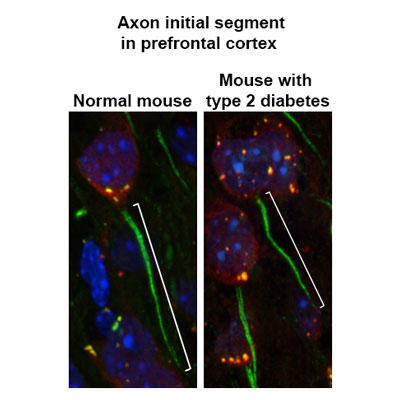Vital Signs » Summer 2018

Leonid Yermakov is fascinated by the human brain, so much so that he is almost committed to working in neurology or psychiatry after medical school. The M.D./Ph.D. student at the Wright State University Boonshoft School of Medicine is keeping an open mind, however, and assisting with some valuable research before he graduates.
Yermakov studies in the lab of Keiichiro Susuki, M.D., Ph.D., in the Department of Neuroscience, Cell Biology, and Physiology at Wright State. With his guidance and funding from the university, Yermakov has helped improve science’s understanding of the effects diabetes has on nerve cells. Just as important, his research has illuminated the disease’s potential for impacting cognition and mood.
“Everything we do, all of our thoughts, worries, dreams and desires — all of these incredibly complex and very human processes somehow boil down to the function of the brain, and, even more incredibly, to the function of single cells,” Yermakov said. “These single cells are the neurons. To me it was a very natural transition from being fascinated by the beauty of human intellect and the ability to experience a myriad of emotions to my curiosity about the inner workings of the neuron.”
The diabetic connection was included because of the remarkable effects the disease has on health. He wanted to study its effects because it is so common. The Centers for Disease Control and Prevention estimates that 40 percent of the U.S. population will develop Type 2 diabetes.
That’s nearly half the population. For Yermakov, solving that large of a problem would be a big win for public health both in the United States and internationally.
“I specifically study the axon initial segment, a region of the neuron where action potentials are initiated,” Yermakov said. “An action potential is how neurons communicate with one another. It’s an electrical impulse that transmits information between cells.”
By studying the axon initial segment, the goal is to better understand processes that underlie brain function and how disease states, such as diabetes, can affect them. Yermakov uses a technique called immunohistochemistry, wherein proteins in the cells of tissue sections are imaged by exploiting antibodies that bind to them.
The technique allows for studying the morphology of neuronal structures in great detail. Researchers can effectively visualize neurons and observe changes that occur due to disease processes. A cutting-edge microscope in their lab allows them to take high-resolution images of neurons and even create 3D reconstructions.
The work has revealed that Type 2 diabetes causes axon initial segments to shorten in brain areas associated with cognition and mood. Though that may not sound too groundbreaking, it came as a surprise for Yermakov.
“Turns out, the axon initial segment plays a vital role in regulating the electrophysiological properties of action potentials. Things like action potential magnitude and how fast action potentials are generated by the neuron — they all depend on the structural properties of the axon initial segment, such as its length and distance from neuronal soma,” Yermakov said. “The shortening of the axon initial segment that we discovered could mean reduced network activity in brain regions responsible for things like memory, decision making, and mood. And that is not something you want happening in your brain.”
For the find, Yermakov won the 2018 Outstanding Student Award for Medical Research from the Wright State University Academy of Medicine. The impressive student scientist sees the findings as a first step to developing better diabetes treatments one day.
It’s a little piece of an enormous puzzle that can likely be solved with future research. Yermakov and colleagues, including several doctors from Cincinnati Children’s Hospital, are already gaming their next moves. They are planning behavioral studies that will allow for testing certain aspects of cognition, and also hoping to study autopsy brain samples from patients who had Type 2 diabetes to see if similar abnormalities are present.
“With future research, we will understand how diseases such as Type 2 diabetes can predispose patients to cognitive impairment and major depression. However, being an M.D./Ph.D. student, I can’t help but think about how we can help patients now,” Yermakov said. “What treatments can we come up with, if not to fix, then at least to lessen the neuropsychiatric complications in patients with this disease? We have identified some exciting candidates that shorten the axon initial segment in neuronal cell cultures that could become targets for treatment.”
— Daniel Kelly

